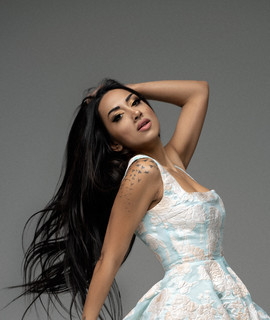#zejna
Text
Eurovision 2024: #30
30. SERBIA
Teya Dora - "Ramonda"
17th place
youtube
Decade ranking: 113/153
[Above Marcus & Martinus, below Uku Suviste]
Pretty floordrops, beautiful floordrops.
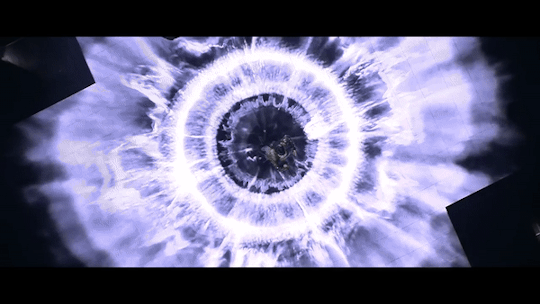
She did two things well (1) beat Breskvica, because christ 2024 was already enough of a hatefest without an entry that brazenly called for a Kosovo invasion by a country that, unlike Israel, has actually been internationally condemned for genocide, and (2) visual effects. If you're going to be an insipid bore then at least give the eyes something so I don't have to fight my narcolepsy when I listen to your tedious song.

Otherwise though, I struggle with Teya *BORE*a. If "adequacy" had a face it would be her sullen one. Does this woman know what "serving" is? It was baffling to me how someone who permanently looks and sounds like she could fall asleep at any moment has such a rabid fan following? It's not like Pesma 2024 didn't have epic women on offer such as say, Zejna (sample lyrics: "ZEJNA! THE BEST ONE IS ZEJNA! THE BEST ONE IS ZEJNA!" 10/10 libretto) or a new and better KONSTRAKTA?!
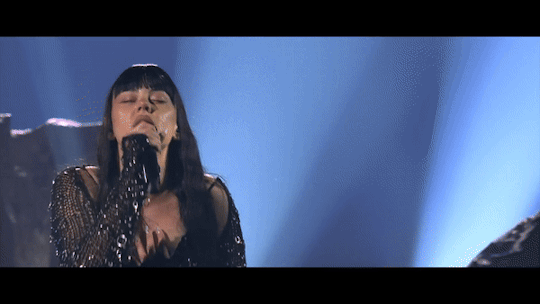
Of course, you know, many people believe Serbia and Balkan Ballads are ~*A Match Made In Heaven*~ but me personally, I've always associated Serbia with Girl Power. Marija, H-h-h-hurricane, Konstrakta, Bojana, Sanja >>>>>>>>> ANY of the many fucking BORE-ASS BALLADS the Yugos are responsible for.
And what is "Ramonda" if not an all-caps BORE-ASS BALLAD? A lot of the ennui is Teya's complete lack of energy, but still. Song plods along for three minutes, leaving virtually no impact. It does not register EVEN WHEN you take the visual effects into account. Any other country and it is either NOT in the final, or in the final with a Guncikova result of 50 jury / 0 televote. It is thoroughly uninteresting.
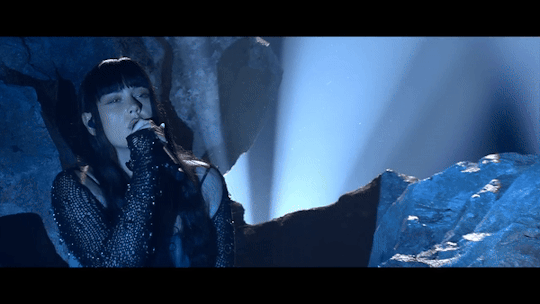
However, as with "Unforgettable" I will note the act - "Ramonda" attempts to look good, enough to not make it feel like completely useless filler. However, the effects aren't that impressive by themselves. A few floordrop explosions some strobe lights, a lilac near the end, that's it? Eh. Regardless, if one attempts to direct attention away from the song with enticing visuals, does one have confidence in the song? I'm not quite so sure, babes.
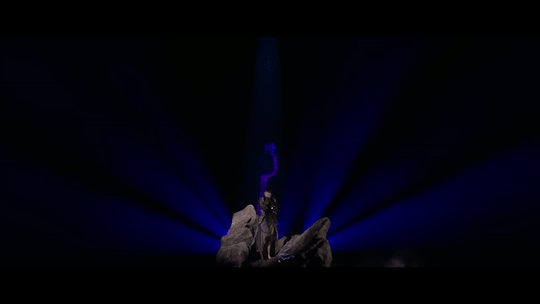
Ultimately my sentiments boil down to (1) the song being a big ball of nothing (2) Teya looking and sounding like she's high on barbiturates, and both of those things make it.. very not exciting for me. I didn't need it in the final (Serbia definitely deserved an NQ- but she's a borderline semi 1 qualifier that isn't Raiven so who curr) but once it got there, eh. "Ramonda" didn't get into the way of Eurovision 2024's overall excellent results, which is all I can ask from the token insipid filler bitches that qualify in every year, so~
THE RANKING
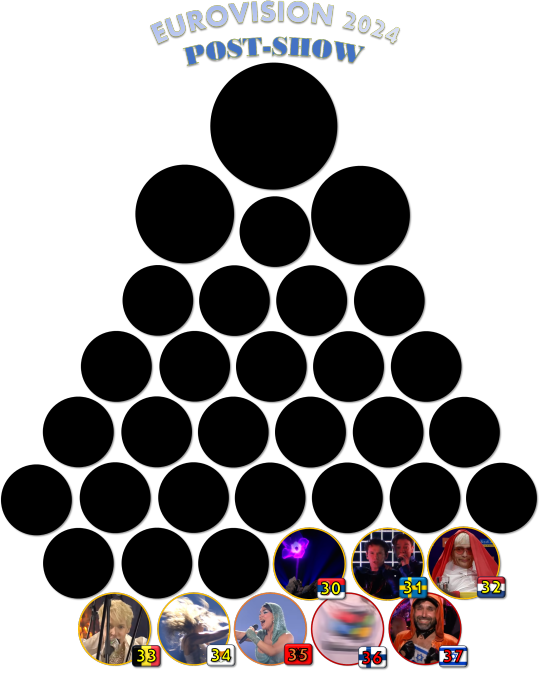
#esc#eurovision#eurovision song contest#borisbubbles#Eurovision 2024#ESC 2024#Malmö 2024#Serbia#Teya Dora#Ramonda#Youtube
9 notes
·
View notes
Text
eurovision '24 semifinal 1 early review
content and spoiler warning for croatia, cyprus, ireland, lithuania, poland, serbia, ukraine, australia, azerbaijan, finland, iceland, luxembourg, moldova, portugal, slovenia, germany, sweden, united kingdom
croatia - it's not easy going first but this is a bad way to do it regardless. already the woke agenda has us singing about anxiety attacks. if you are prone to anxiety get off the stage and let real warriors conquer the hearts of evropa. "my presence fades to black" yeah i wish it would. qorban/10
cyprus - many have said this before but i think cypriots should launch missiles at ankara just to see what would happen. singer is very serbian looking with the ironed long hair, very 2008 romcom looking music video (complimentary), forgettable song, thus has got to be someone's niece. mid/10
ireland - thank you god for making our enemies this embarrassing. i just know she had a self harm tumblr blog in 2013. very sincerely sending this to eurovision is comparable in national humiliation to the treaties of trianon and versailles. 30 year old antisemitic pagan themlet/10
lithuania - this is nothing. lithuania/10
poland - kinda of a normal pop song, i can see myself hearing this on the radio while stuck at a red light. good to see a weird looking woman. jeszcze polska nie zginęła/10
serbia - #JUSTICE FOR BRESKVICA. zorja or zejna or breskvica would have mopped the floor with her. this will lose and it will deserve it, hopefully all the PZE jury members including sajsi will be executed in a public square. bad/10
ukraine - hate to say it but the loathsome ruthenians have once again sent a good contestant. if my last name was Shemaieva i would simply not use Heil as an artistic name. i can hardly believe i'm saying this but i think it would be better without the fat girl rapping. critical support for ruthenian autonomous oblast/10
australia - my opinion is colored by the fact that i was viewing the music video, which is a consistent two and a half minute face closeup of the white guy cumming. the song itself is not bad, but i could do without the white guy cumming, actually. australia gets a pass this year/10
azerbaijan - you can always count on the iranic people to sneak in subtle references to sun-worship. oldest trick in the book. considering this was the last song picked, this was maybe not worth the wait. don't want to doxx anyone but one of the backup dancers looks like a beloved tumblr user. eeh/10
finland - random xD WAFFLES. the "what does the fox say" candidate of the year, and of course its from the turbo-autistic finns. total opposite of tact and taste. the west has fallen to its far-easternmost asiatic enemy (the mongols (finns)). beyond repair/10
iceland - based for sending an older woman. this is pretty good, nothing much to add. will maybe listen to the icelandic version. top quartile/10
luxembourg - israeli broad with skinny arms singing in french ? *wiping the sweat from my brow*. finally something worthwhile out of europe's last grand duchy. am yisroel chai/10
moldova - pleasant surprise out of the illegitimate romanian province of moldova. dignified in an atmosphere where others have been deliberately embarrassing. not impaling anyone's heart/10
portugal - this is nothing. portugal would benefit from being brazil's european vassal state. meu curaçao :(/10
slovenia - the best of the three of this exact performer that we've seen, not that that's very high praise. eeh/10
germany - pleasant surprise in an otherwise very mid year. not the worst guderian i know. germany/10
sweden - i can feel the martin x marcus x reader spam in the tags already. usually they at least send something that's listenable under normal circumstances but not eurovision-material,but not even that this time around. as always, marg bar sweden/10
united kingdom - (watching the official music video) lol that's probably 4k/mo in london. nobody cares about the failstate of the united cringedom, they should have been excised from the contest when they left the eu. nice trainspotting references in the clip tho. bleh/10
final conclusion - overall very disappointing year, luxembourg stands in a separate category, even without the ethnonarcissism. germany, moldova, iceland, ukraine are okay but nothing to be thrilled about. the plague of appealing to jury votes at the cost of anything interesting is crushing this competition. seeing what got passed up in serbia instead of teya dora makes one wonder what the situation is like in other countries. help me, zejna. zejna, help me. i hope semi 2 will be better but there's not many heavy hitters
3 notes
·
View notes
Text
Zejna, Zorja, Teya, Konstrakta - bilo ko samo ne kajsija
2 notes
·
View notes
Text
Before Serbia select their Eurovision entry tonight, I've taken another look at the Pesma za Evroviziju finalists
Zorja – Lik u ogledalu
Zejna – Najbolja
Keni nije mrtav – Dijamanti
Konstrakta – Novo, bolje
Marko Mandić – Dno
Hristina – Bedem
Breskvica – Gnezdo orlovo
Džordži – Luna park
Teya Dora – Ramonda
Iva Lorens – Dom
Dušan Kurtić – Zbog tebe živim
M.IRA – Percepcija
Nemanja Radošević – Jutra bez tebe
Milan Bujaković – Moje-tvoje
Lena Kovačević – Zovi me Lena
Bojana & David – No No No
I generally enjoyed the semifinal performances, though unfortunately one of the ones I least enjoyed was actually Filarri’s – it was a shame since he had my favourite song, but the staging was offputting. I loved his outfit, and I do appreciate the overall message of the song, but I feel there could have been far better ways to convey it than using the human figures projected on the screen in that way. I understand it not qualifying, but Ko je ta žena is definitely a song I’ll come back to.
However, I have a new favourite! I already liked Lik u ogledalu, looking at just the songs I put it as one of nine I’d be happy winning, but after seeing it performed this is now my clear personal winner! I thought everything about it was incredible, the staging was great, with the way the harsh spotlight against the darkness isolated her at the start, to the way they incorporated the titular mirrors, to the moment of vulnerability at the end where she faces herself in the shattered mirror – I found it really moving. Zorja also has a fantastic voice, she sounded beautiful throughout and nailed the top notes!
While there are still plenty of other songs I like – Konstrakta’s performance was great and I find it really interesting how Novo, bolje serves as a continuation of In Corpore Sano, making a point of using all the same staging aspects to highlight how things haven't changed, and I still love Najbolja and Dijamanti as songs, even though I could have done with a little more energy actually from both of the performances with how high-key the songs are – I want to see Lik u ogledalu win tonight. Zorja could take that performance as is to Eurovision and would sail through the semis, and hopefully far up the scoreboard in the final! That said, while she’s become my clear standout, I do still feel that Serbia should comfortably qualify with most of the options they’ve got.
#eurovision#esc2024#nf ranking#serbia#I would apologise for the massive run on sentence...#but to be fair I'm not that great at writing concisely#these things usually get a bit rambly anyway
3 notes
·
View notes
Photo
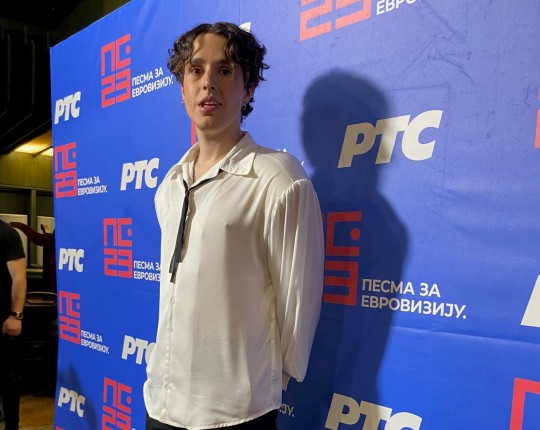
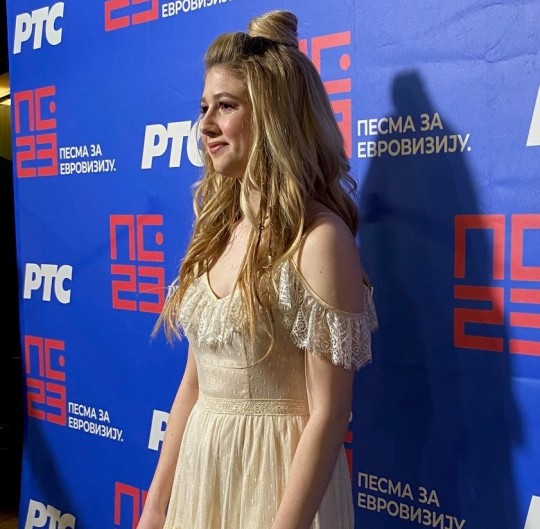
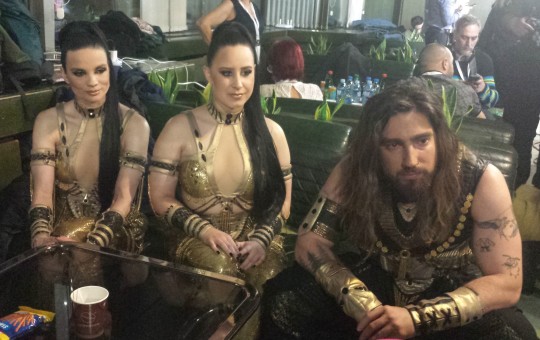
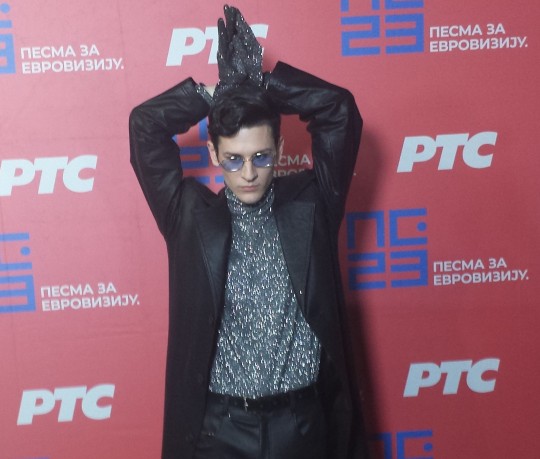
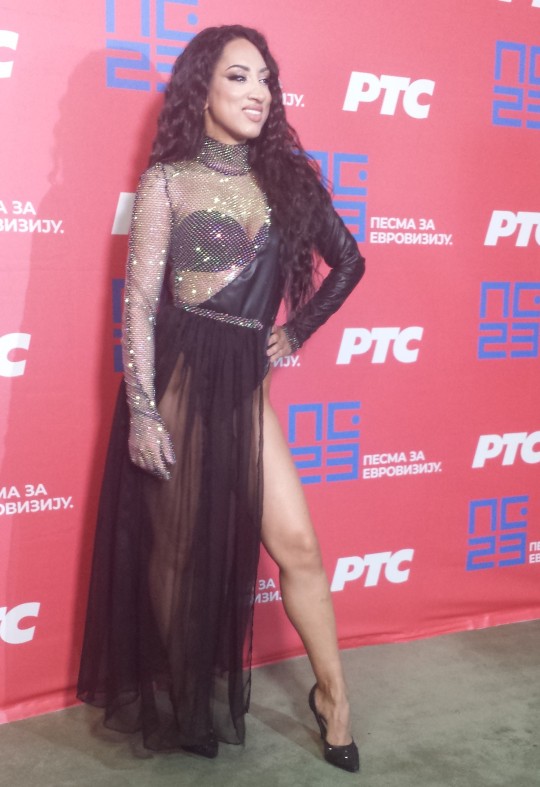
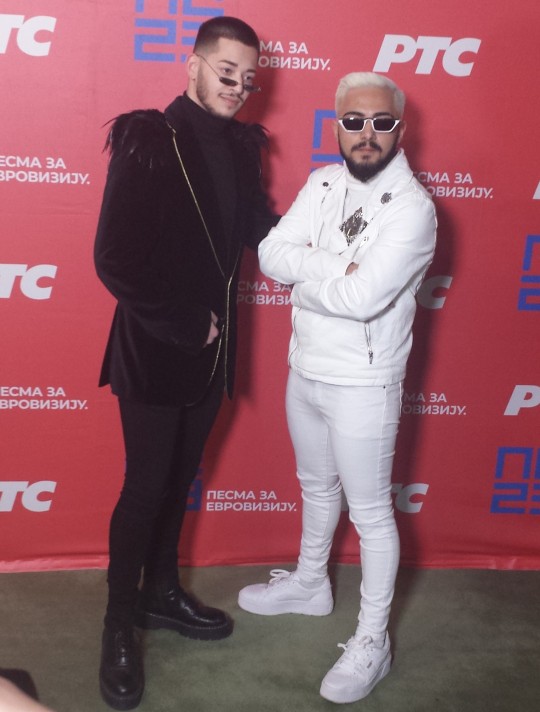

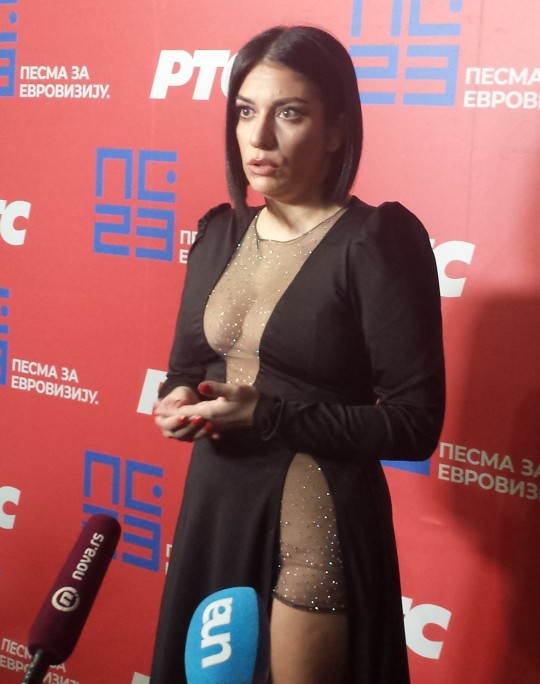
SRBIJA JE IZABRALA: Luke Black pobedio na izboru srpskog predstavnika za Pesmu Evrovizije
Luka Ivanović, sa internacionalnim muzičkim imenom Luke Black (Luk Blek), predstavljaće Srbiju na “Pesmi Evrovizije”, koja će biti održana u maju u Liverpulu. On je sa pesmom “Samo mi se spava” osvojio najviše glasova od žirija i publike (oba puta dobio po deset bodova) i, u konkurenciji koju je imao, zasluženo pobedio. U finalu "Pesme za Evroviziju", održane u velikom studiju RTS-a u Košutnjaku, nastupilo je 16 izvođača koji su to pravo stekli nakon dve polufinalne večeri. Nakon glasanja žirija, prvo mesto sa najviše glasova zauzimala je mlada Nađa sa pesmom “Moj prvi ožiljak na duši”, na drugoj poziciji bio je Luke Black, a na trećoj Filip Balaš sa pesmom “Novi plan, drugi san”. Publici se najviše svideo Princ (od Vranje) i pesma “Cvet sa Istoka”, dok su iza njega po broju glasova bili Luke Black, Džipsi, Filip Baloš, Nađa, Zejna, itd. Pobednik Luka Ivanović je muzičku karijeru počeo 2014. kada je imao 22 godine. Iz Čačka je došao na studije u Beograd gde su ga zapazili predstavnici producentske kuće "Universal Music". Tako je postao prvi solo izvođač iz Srbije koji je dobio ekskluzivni ugovor sa ovom kućom. Njegova muzika je, doprla do Kine i ostatka azijskog tržišta, što mu je omogućilo da tamo ima turneju. Već je jedanput (2016. sa pesmom “Demons”) pokušao da bude predstavnik Srbije na Pesmi Evrovizije, ali je tada umesto njega RTS odabrao Sanju Vučić. Luka već nekoliko godina živi u Londonu, pa će na Evrosongu u Liverpulu biti kao na domaćem terenu.“Mnogo sam srećan zbog svega. Ali, i još mi treba vremena da bih mogao da dam neku normalnu reakciju i iznesem sve planove u vezi nastupa u Liverpulu. Delujem možda ravnodušno, ali mi se zapravo ostvario jedan veliki san“, jedna je od prvih reakcija Luka nakon pobjede. Pesma “Samo mi se spava” je prvobitno napisana na engleskom, ali ju je Luk delimično preveo na srpski za potrebe ‘Pesme za Evroviziju’. „Meni se strašno sviđa to što sam dodao srpski jezik. Dalo je neku drugu notu i ozbiljnost. Možda se i više saosećam sa pesmom kad je na srpskom“, kaže Luk Blek.
#pesma za evroviziju#evrovizija#eurovision song contest#liverpool#srbija#serbia#luke black#muzika#zabava#pesma evrovizije#eurovision#ogae serbia
2 notes
·
View notes
Text
22.1. - 28.1.2024.
Knjiga:
Matthew Perry - Prijatelji, ljubavnici i velika užasna stvar
Na prvu te ne uvuče, ali se ubrzo zakačiš i zaintrigiraš za njegovu priču.
Netflix:
Queer Eye
youtube
8. sezona već. Bolje je kad se epizode ne gledaju po redu haha.
Love on the Spectrum U.S.
youtube
2. sezona. Klasično ok.
Glazba:
Tate McRae - exes
youtube
Sara Jo, Mimi Mercedez - Sandra Meljničenko
youtube
Pesme za Evroviziju
Baš me zanima koga će Srbija poslati. Na prvu su mi zapele za uho Zejna, Filarri i Teya Dora.
0 notes
Text
I kveld: Andre semifinale i Serbia
Åtte finaleplasser igjen! Hvem fortjener å få de? 🇷🇸
Pesma za a evroviziju har avholdt en av sine to semifinaler i går, og i kveld er det tid for den andre. På samme måte som i går er det seksten semifinalister som skal bli til åtte finalister, og det er 50/50 jury og publikum som bestemmer hvem dette blir. Disse står det mellom i kveld:
Hurricane – Zumi zimi zami
Nadia – Devojka tvog dečka
Filarri – Posle mene
Zejna – Rumba
Frajle – Neka,…
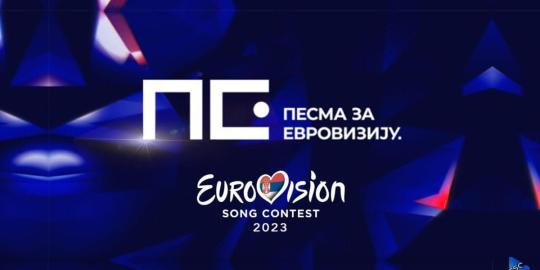
View On WordPress
0 notes
Text
Blood and Honey: An Interview with Dr. Danica Anderson on Healing for Women War Trauma Survivors
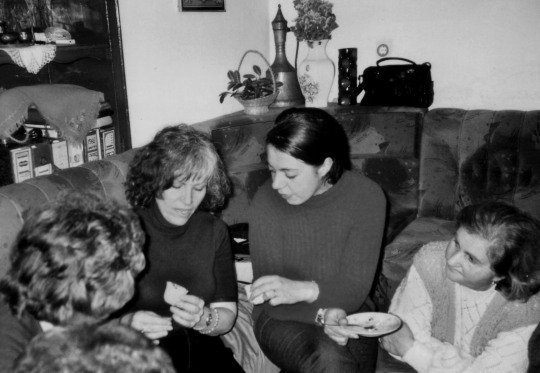
Danica Anderson reading coffee grounds (tasseography) in Ahmica-Vitez, Bosnia
On a quest to connect my grandmother and Zejna, the Bosnian refugee we sponsored together in the 90s—I am sure not by accident—I discovered the work of Dr. Danica Anderson, author of Blood and Honey: The Secret Herstory of Women, South Slavic Women's Experiences in a World of Modern-day Territorial Warfare. In this book, she explores war trauma experienced by women during the Balkan War. Through recipes, and cultural customs, Blood and Honey is a book of spells for these women to heal themselves through bioculinary* arts and biosemiotic** communication. In this beautiful interview, she brings me closer to Zejna and my grandmother, and reveals woman-centric secrets to understanding the rhythms of our subconscious. From coffee readings, to Marija Gimbutas you will love the magic, mystery and healing of this interview!
* Inscribed social memory working collectively with agriculture, herbs, food crops, animal husbandry to bee keeping that preserve South Slavic ancient Neolithic Practices.
** (from the Greek bios meaning "life" and semeion meaning "sign") is a growing field of semiotics and biology that studies the production and interpretation of signs and codes in the biological realm.
First, I would like to ask how your family's trauma from former Yugoslavia was manifest in your life in Chicago. You mentioned that your mother didn't want to speak of it. Was silence part of the intergenerational trauma?
The killing silences are transgenerational in that the silences are passed to future generations. My mother was indoctrinated into killing silences by her mother and grandmother both who lived through world wars in former Yugoslavia. It was not until her late 80’s that my mother spoke of her WWII concentration camp experience to her granddaughter. I don’t think she had the words previously due to shame and guilt that was not hers.
The way trauma ebbed and flowed in my childhood was seen with domestic violence and child abuse. I have early memories, which children who survive child abuse often have. Although the child or infant is preverbal, these memories are stored in the body and often unable to be given a vocabulary until the child’s development of language. This is how children are not aware their lives are violent and instead think it is normal. With the mother submissive and beaten into the killing silences where she has no one to tell, the child cannot gain a vocabulary for the trauma. Instead the killing silences are epigenetic (we are shaped by environment that influences our genome,) thus transgenerational trauma.
You also talk about the women in your Serb community and their bioculinary traditions and ethno-dance traditions, which were both healing, and the foundation of your book's philosophy. Can you describe how these traditions manifest away from one's country of origin? Did your family grow their own food, for instance?
To describe how oral memory traditions capacity for the transmission of human memory is best done when we realize it has been done with a cast of thousands of generations and continues to this day no matter where the geographic location. We are talking about millions upon millions of actors taking up their role in performing the enactment of memory-lived life experiences of our ancestors without external aid meaning no books, scripts to read from, youtube or modern day manuals. If anything, the oral memory traditions are exactly the data needed for study in long term memory and transmission of memory over the Ages with such a vast pool of actors.
What I have observed in the diaspora of not just the South Slavs, but all diverse groups of people is how they reach for their human memory storage triggered by geographic relocation. In one way this is how travelers experience their journeys, a triggering of human memory in their lineage of ancestors’ life experiences. The culture and corresponding oral memory traditions (a ritual science) contain the way of life and the adaptations to the environment. Fleeing the violence and aftermath of war, my parents immigrated through Ellis Island to Chicago. They brought with them their way of life. We had a small back yard for the garden of vegetable and plants. My father would trek to the Southside of Chicago to the train station each fall to buy crates of grapes for wine making. A wooden barrel with an iron press in our basement was arranged so that all my siblings and I would pick off the grapes and toss into the sink to wash and then into the barrel. This took days. Once done, since I was the littlest I was placed into the press to squash the grapes. I remember having stained purple feet and legs. My mother made everything from scratch. Her strudel called ‘pita’ was the finest of translucent phyllo dough she stretched over the kitchen table. The kitchen table was where I would crawl under and watch my older siblings dance the kolo (s)- Serbo-Croatian for folk round dance. The food and gardens are bioculinary practices found in oral memory traditions, a ritual science.
I never considered tasseography (tea or coffee readings) as such a powerful way to tap into the protolinguistic self and heal trauma. You describe "storied instructions" through "small acts", meaning, and the construction of new memories over traumas through mindful experience of the everyday. This is an essential aspect of your book, Blood and Honey Icons: Biosemiotics and Bioculinary and it also is incorporated into your trauma recovery work with Bosnian women war survivors. What kinds of transformations do you witness among women who have been subjected to gynocide and sexual trauma?
The small acts are often repeated and done daily or seasonally through thousands of generations into the present generation. The present generation layers over the oral memory traditions with their environment and life experiences. This is an extraordinary transformational process when you realize that what we live, feel and experience both biologically and even psychobiologically is heritable: transgenerational. Basically, how we live and our life experiences has far reaching social, cultural way of life implications.
The way of life for women is targeted by wars and violence for this very reason since we live in a phallocracy where the male dominates. Yet, women are the creators of culture since we are all born of a woman. Her domestic arts and child rearing are critical transgenerational intangible heritage that evolves our relations with our environment embodied with her life experiences. The Bosnian women war crimes and survivors cleaned up after each war that took place over a century. In doing so, her domestic labor and child rearing was one of survival not evolving thus thriving. Transformations were had by the women survivors who no longer could stand the survival mechanisms found in trauma. The critical juncture was ‘to ask do I need to survive or thrive’. What happened in the aftermath of the Balkan War was a return to what their grandmothers did to survive such as the beehived wood ovens, garden, weaving to dancing the round folk dances called kolo (s).
What I am talking about is how the transformations came through when women regained their role as creators of culture and corresponding oral memory traditions- a ritual science containing prehistoric chants, songs, dance to bioculinary and all way of life before the modern conveniences. One Bosnian war survivor stated when she had nothing, she discovered she had everything with her house that had a field of crops and chickens. She said the farmer and those chickens saved humanity thus transforming humanity.
When survivors did not have an oral memory tradition to transform mostly sexual trauma and genocide, I was told to talk with those struggling. In my paper on Slavic Maternal Fright I wrote about a thin Bosnian-Herzegovinian pregnant woman in her late twenties had big dark circles under her eyes; her hands shook even at rest. When she began sharing her maternal fright, she released expressions that were formerly deliberately hidden and avoided. Her fear was that her husband’s loss of 18 family members at the village of Ahmica-Vitez, Bosnia on April 16, 1993 would flood into her fetus. You see story and metaphor heals only if we author our life experiences. Since trauma is primarily about extraordinary experiences in the personal lives of individuals with women and children the majority facing such impossible circumstances, what occurs is an explosive quality because change is immediate. Thus, her stories are excluded. Women, 51% of world population suffer greater trauma and she is removed from restructuring a self-identity. In the end women cannot reestablish their place in the broader scheme of human affairs and history. Without women’s authored stories and metaphor, we do not have culture. We cannot access healing methods. Instead what is claimed as culture is in reality violence normalized and nationalized with a host of memorials and monuments.
For sixteen years, I have been working extensively with the Bosnian-Herzegovinian women war crimes and war survivors in the aftermath of the Balkan War (1991-1993). I have determined that maternal fright is the entrainment of transgenerational fear and trauma through the female neurobiological processes (Anderson, 2014, Christie, Pim, 2012). This pregnant woman took a green magic marker I brought with an art pad to her apartment. She took the marker and drew a spiral on her pregnant abdomen. When she was done she stated this new oral memory traditions would prevent the transgenerational transmission of trauma. She said she was transformed. She became author of her own story which was excluded and not conforming to the norms of violence.
There are many more stories I write about in my book, Blood and Honey the Secret Herstory of Women: South Slavic Women's Experiences in a World of Modern-day Territorial Warfare. In the chapter of Salutogenesis, the promotion of health, I share the story of a Croat young woman who was sold into sex trafficking in the aftermath of war. Her transformation came more than a decade after I met her in Holland. I asked her to write her story for my book. She took eons to respond and when she did what she wrote was compelling. She told me that she could not retell the story since she is no longer that pain or that victim. In fact, she said her story was not her responsibility anymore and that it was mine now.
As I've shared with you, I recently reunited with a Bosnian Muslim woman my grandmother and I sponsored in the 90s. Her life is very simple, she was not traditionally educated, and she is now 80. She was also subjected to incredible war trauma, which I did not feel entitled to ask her about, even though she wrote me about it in her letters. How do you interact in your Kolo: Women's Cross Cultural Collaboration work with women from various backgrounds and ages? Are there common experiences and acts you found to bond women across these experiences?
Isn’t this the ‘killing silences’ when you and most women feel they are not entitled to ask for grandmothers, mothers and daughters’ life experiences. Yet, you moved forward. The transformation is there in your grandmother’s letters thus providing intimacy and bonding. Note how you were able to set up a space and place for your grandmother’s war stories and trauma. The common experiences and small acts that you performed for your grandmother are the same I invite in when I interact with women. To be sure there is diversity involved since their traumas and life experiences like fingerprints are not identical.
With the South Slavic kolo, the round folk dance or to be in a circle is a multi-dimensional space creating place for women to bond and heal. What I noted was when there is healing, there is bonding and a moment of female solidarity. Having a space and place to heal is the real hospital. Interesting in the word hospital since it originates from the meaning for guest and is the root word for hospice, hotel and hospitality. The key is the relation between guest and shelterer. As with my kolo trauma work and your grandmother’s letters the relations between us and them become one while accepting the diversity. When I faced the Bosnian women in the beginning of my work in Bosnia I knew I was in a room filled with my mother in everyone present. Something in what I felt opened up the space and place for us to bond and to heal.
While daunting I was able to move through my grief with my mother and her WWII concentration camp experience became the common experiences from which women bond, learn and evolve. I knew I had privatized my pain and suffering. My mother privatized her pain and survivorship of Jasenovac concentration camp. Shock cascaded through me since the violence against women stats became a lived knowing. What I mean is I realized the universal suffering and pain most women endure but we are not allowed to voice or speak our realities in a world of violence. Isolation from each other occurs. Women’s inhumanity to women perpetuates endlessly. When I danced the kolo with the women and men, we were all shoulder to shoulder although our feet were doing their diversity in dancing the same path. The feelings of detachment and divorce from female solidarity erased in the shoulder to shoulder circle and dance. Female solidarity flourishes once we include each of our stories and understand our pain and suffering is universal. Privatizing smothers any opportunity to bond out of strength. The movement to be in a circle or the kolo is non-verbal expression of female solidarity; bonding out of strength. There is no bonding as a martyr or a victim.
I love that you refer so often to Marija Gimbutas' scholarship, which I was so fascinated with in college. Her work on SE European goddess-worshipping culture is so profound, and highlights that region as such an important location for honoring the female. How did such a patriarchal, gynocidal culture evolve from one that was so in balance with the natural world of that region?
In the beginning my visits to Bosnia showed how penetrating trauma can be. How do I then work the trauma issue outside the patriarchal norms of authoritative institutions and the ethnic hatreds focused on women as targets? However, I knew the South Slavs in prehistory had a harmonious civilization with profound art in artifacts and their communities. The symbols in what Marija Gimbutas refers to as ‘Old Europe’ lasting until 1800 BCE guided a path to circumvent the patriarchy. What was striking in their kilms, needlework and beehive ovens was the Old Europe symbols. Imagine my awe when the women who used the Old Europe symbols knew the meaning without cracking any of the Marija Gimbutas’ books.
The kolo is Mesolithic in age and something all knew and often danced. In using Gimbutas’ materials and spinning through interdisciplinary fields I was able to excavate the balance of the natural world. When we did so there was great gnashing of teeth and horror. One elderly grandmother said aloud how she taught her children to hate and to hate women. Another woman questioned on the custom to revere the mother who has sons over one that has daughters. What spiraled was activism even if it was banging pots and/or marching the streets for garbage pickup. One woman stated life is better now after the war without the supermarkets, microwave since her small house with a field of crops brought her family together. She became the wise woman who know how to plant, ferment, cook, clean and organize into relations with the natural world and her family.
If you can trace back to when women were forced to carry their father’s name you will see the erasure of women; the erasure of relations with the natural world and; erasure of honoring females. In an old Villa outside Paris is the archeological museum. I moved through the salons of time from dinosaurs to present day. When I walked through the exhibits in the prehistoric window about 80,000 BCE was the Siberian sleeping Goddess artifact. More art popped up, such as the Willendorf Goddess artifact, which is 33,000 years old. But then, the Iron Age appeared with axes, swords and violence. Yet, when I look at culture and oral memory traditions vestiges of old harmonious way of life I find that it is still repeated. This brings me to my work and research where we need to ask what culture is. Many cite violence as culture with ‘boys will be boys’. So we need to ask what violence is. Culture is the way of life centering on women and their female biology processes. Women raise the children. Women create culture. When women forget their creator role in culture or are dominated to not assume their creator role we will continue to be dominated and complicit in following patriarchal norms of violence, we will have the escalating violence.
Finally, I would like to ask you a personal question. I also mentioned that I sense I have been on a "homing" instinct with the former Yugoslavia, traveling back through the influences of my grandmother, who also knew the Balkans because she read Black Lamb, Grey Falcon by the feminist, Rebecca West. This process took me 16 years! Do we go back to the places of deep ancestral knowledge, and even trauma? And I also wonder, why is the process sometimes so long, and so unclear?
The birds do it. The salmon in the oceans do it. It’s called migration. Migration is not refugees fleeing from horrors and violence. Diaspora is not migratory process. Not all species have the magnetic direction for migration. For instance cattle and deer will align themselves in the north-south direction of earth’s geomagnetic field. Pigeons have microscopic balls of iron in their inner ears. How do the whales and dolphins know their way in the vast oceans when migrating? Perhaps, this is the homing instinct you talk of.
It took me 16 years to write Blood & Honey: The Secret Herstory of Women. A very long migratory process and I am elementally changed due to it. I migrated back and forth to Bosnia throughout the years and many other war zones across the globe. My female tacit knowledge- the ‘more than we can tell’ intelligence looks at the epigenetic inheritance which is inseparable from our lived relations to our ecosphere and our cultural environments. I am reminded of that cast of thousands of generations and billions of main actors in the building of a continual process of learning and relearning. Hence, the definition of migration.
All of this is stored in our genome. What we repeat is how our DNA replicates and repeats. This is called evolution. Our biology of perception and our human perception is embodied and literally enworlded. When we learn or relearn we are migrating toward abundance- evolving not just ourselves but all of life. One research for bioculinary practice was about how chickens become fuller in the breast and bigger since the 1500’s because we were eating them.
I do not define trauma as a mental illness. If anything, trauma and the corresponding fright/flight neurological mechanism tell me it’s healthy. My definition of trauma is intensified learning. Yes, it is not something I would jump at to enroll in this beyond doctorate level learning. In fact, most would go kicking and screaming before succumbing to trauma events. Most likely, we relive the trauma over and over again due to the fright/flight mechanisms. Here we can introduce a question to ourselves; do we need to survive or do we need to thrive? That choice which is consciousness allows us to author which venue. Thriving is about the healing process and of course becoming authors of our own stories. The diversity of our stories like the diversity of the kolo dance steps offer up restructuring and reorganization of reality. We are consciously learning to relate to all our environments. Women, especially, learn the empowerment in the role of creator of culture. Men learn to preserve, support and protect culture and all environments. Together the prescience in relation to biological and social complexity- a social intelligence emerges.
Being unclear is not about a lack of clarity since when we make a decision it is with clarity. I think the pattern of being unclear is about not being comfortable with ambiguity. Pregnancy is a good example of being in ambiguity. Childhood not adulthood is a difficult endurance to neither be here or there since decisions release that tension effortlessly. Ambiguity is the state of being not doing. In our societies the fast paced and competitive demand to not fail force us to conform to doing and productivity. More importantly, ambiguity is akin to the kolo in manifesting space and place in time. We need to create a space and place for deep ancestral knowledge.
Biography
Dr. Danica Borkovich Anderson’s interests remain consistent with exploring trauma’s impact as not a death sentence but an enrollment into intensive learning and growth. As Danica points out, the essence is summed up in the concise, collaborative social justice and self-sustainability found in healing our own local communities and ourselves. It’s about ennobling and empowering those who have suffered catastrophic violence and crisis.
Working from a base as a forensic psychotherapist (Certified Clinical Criminal Justice Specialist #16713), a balance of her work has been abroad in Africa, Bosnia, India and Sri Lanka as well as in the United States. While in the U.S., Danica’s experience and training began with the Siletz Indian Tribe in Oregon covering thirteen counties. She served this area using her experience in the clinical field of sexual abuse and abuse issues for a number of years. She has also worked in crisis care for corporations and insurance agencies since 2000.
Danica’s professional experiences delve deeply into “untamed” territory and explores possible engendered approaches that are healing, collaborative and are in sync with the environment presented.
She has conducted extraordinary in-depth work with Bosnian Muslim women war survivors and war crimes survivors. This work is enhanced by Danica’s bi-lingual capacity as a Serbo-Croatian. A decade of work is completed and is now self-sustaining by the Bosnian women. As a Serbian-American daughter of former Yugoslav immigrants whose mother survived concentration camps, Danica researches trauma and its impact identified by social studies that are significantly centered on the female, thus radiating out into both genders and the community at large.
Danica’s consultancy work as a gender psycho-social victims’ expert with the International Criminal Court (The Hague, Netherlands), addresses the importance of a trauma treatment and training curriculum that is distinctive and responsive to the impact of catastrophe and disaster events. Her work considers a wider set of relationships between trauma and environment in which trauma is situated or, alternatively, how the specific culture is perceived in the trauma exposure. Fluid and adaptive across vastly differing and diverse penal and corrections/prison systems including those of military operations, the Kolo trauma treatment and training format has a much broader spatial scale of overall distribution, becoming self-sustainable via the affected population. Anderson’s service in the United Nations World Food Program for the largest humanitarian workforce on the planet in Sudan added profound insight to her research, allowing her to survey a substantive data base that further enhanced her Kolo format.
Danica’s experience and specific skills include:
• The ability to foster not just intellectual understanding but embodiment on topics that are elusive or difficult, cutting edge and innovative or very psychologically based.
• International speaker, presenter/trainer.
• The populations worked with range from: 1) Rebels, militia and war crimes perpetrators (Afghanistan, Africa-Chad, Congo, Sudan & Uganda) and victims of crimes; 2) In Oregon with the Siletz Indian Tribe providing services for 200 tribes and bands; 3) Interfacing and training with individuals and groups in Bosnia, India and Sri Lanka who are professionals in their native organizations as advocates, social workers, Buddhist priests and directors of the agencies open to developing cross cultural collaborative skills in the field; 4) Corporate environments, universities/colleges and speaking engagements at various institutions.
• As a grassroots non-profit, her The Kolo: Women’s Cross Cultural Collaboration work enables her to understand a depth and breadth of both human rights and female human rights especially honed to helping aid in real time and in stark truth positions. Crisis and disaster response protocols and crisis intervention/prevention development and implementation are a few of her in-depth skills. Engendered training programs are few yet critically needed in corporate environments.
#killing silence#kolo#Bosnia#bioculinary#biosemiotics#trauma#genocide#Dr. Danica Anderson#marija gimbutas#migration#tasseography#transgenerational#Blood & Honey: The Secret Herstory of Women#zejna#isota#grapska#mel potter#melissa hilliard potter#slavic maternal fright#interview
26 notes
·
View notes
Text
Dnevnik budućnosti
Bila sam u kuhinji, pravila ručak i, po ko zna koji put, kudila sebe što sam se udala tako mlada. Malo dijete, muž koji mnogo radi pa ga skoro ni ne viđam po danu, obaveze po kući, nekoliko ispita koji čekaju do diplome, koju ne znam da li ću ikada okačiti na zid i sve druge stvari koje idu s tim, vraćale su mi one riječi koje sam do tada milion puta već čula "mlada si, imaš vremena, neće nikud pobjeći život ..". I stvarno, ne bježi nigdje ništa, ali sam se bojala da ću ja pobjeći od života ako ne uradim ono što sam u tom trenutku željela. Ja dvadeset jednu, on dvadeset četiri. Mladi, ali željni da se volimo u vremenu kada ljubav ljudima jako malo znači. I tako, uzeli smo se na jesen ’22. Svadba skromna i za odabrane, ali sretna i ispunjena ljubavlju koju smo gajili godinu i jače. Bojala sam se da će nas to što se ne poznajemo dovoljno dobro, dovesti do toga da se rastanemo brže nego što su to parovi koji su iskusili sve, pa im ni ljubavi nije ostalo za život. Međutim, naša Zejna je napunila godinu prije neki dan, a ja kad god pogledam tog čovjeka koji drži našu kćerku u naručju i tepa joj dok se smije, pomislim "Bože koliko sam samo sretna" i šta me to navede da mislim o tome kako sam pogriješila sa svojim izborima, kada znam da bi svaki drugi, sem ovog, bio potpuno pogrešan.
Dž.
#život#life#balkan#balkan citati#balkan quotes#balkan tekst#bosnia#balkanski citati#memories#love#citati o životu#smisao života#citati#tekst#želja#bosna i hercegovina#bosnia and herzegovina#beautiful
12 notes
·
View notes
Text
disgusting antiziganism that zejna only got 4 points
2 notes
·
View notes
Text
X
#bože koliko mi je presmešno#kad god vidim zejna s ovom obrvom#kao drezik iz nestašnih godina jebote#2001. je zvala i želi svoju izrezanu obrvu nazad#slatka bebo isuse#will izrezane obrve ever stop#😂😂😂😂😂
0 notes
Text
After Moldova and Iceland, Serbia are also choosing their entry later tonight! Here’s my ranking of the Pesma za Evroviziju finalists:
Filip Baloš – Novi plan drugi san
Luke Black – Samo mi se spava
Frajle – Neka, neka
Princ – Cvet sa Istoka
Nađa – Moj prvi ožiljak na duši
Dzipsii – Greh
Empathy Soul Project – Indigo
Nadia – Devojka tvog dečka
Chegi & Braća Bluz Band – Svadba ili kavga
Gift – Liberta
Zejna – Rumba
Filarri – Posle mene
Boris Subotić – Nedostupan
Stefan Shy – Od jastuka do jastuka
Hurricane – Zumi Zami Zami
Duo Grand – Viva la vida
Firstly, I have to say this has been such a good selection! Especially that first semi-final, that would have made a worthy final in itself, I could barely choose eight qualifiers! The second semi wasn’t as strong, but I still enjoyed it. Nearly all the songs were well staged and well-performed, and while the atmosphere was a little odd with the lack of a live audience, it meant that during the songs the camera was solely focused on the artist. I didn’t finalise my initial ranking in time before the first semi, but I do want to say that I think the quality as a whole is high this year – this is one of those rare selections where I could see myself coming back to a playlist of all competing songs.
Before the show, I had Luke Black in first place, with Filip Baloš very close behind, but Filip completely overtook Luke with his live show! I love Novi plan drugi san as a song, it’s exactly my sort of dance music, exciting and addictive! It gets me so hyped up – something about the chord going into the chorus hits just right! I thought this might be hard to pull off live but he nailed those vocals! I also thought this was one of the best staged songs – everything about it worked! I liked his styling, very matrix with the coat and glasses, but with a flash of glitter. The choreography was slick, fitting so well with the style of the song, and despite him staying in the centre of the stage, it never felt static – he exuded confidence and owned that stage! The lighting design was fantastic, I loved what they did with the alternating blue and red lights on either side of him, and the strobing lights in general. It was very trippy, highlighting that vibe from the music.
Like I said, Samo mi se spava was my favourite song going in, and I still love it, but I was a little surprised by the staging. The song deals with depression and despair at the world, framed through video game metaphors. The video game influence comes through strong in the music, with that central drop especially drawing from retro soundtracks. It evoked a real nostalgia in me while still sounding fresh and modern. However, I wasn’t expecting the staging to take that so literally. I thought the dancers were cool, but the giant boss battle complete with health bar and ‘enemy defeated’ graphic was cheesy, and also kind of goes against the tone of the song, which doesn’t end with a happy resolution. However, that's my only issue, I still think this is a great entry.
Those two were my big standouts, but there’s plenty of other acts here that I like! I had a lot of fun with Neka neka just as a studio track, and I thought it was well sung, although maybe I’d have preferred it if they got out from behind the mic stands earlier. Princ’s song is great too, very Balkan, energetic and uptempo. It was also very well performed, and the red/gold/black colour scheme suited it very well. Finally, I was pleasantly surprised by Nađa’s song, which was very sweet without feeling saccharine, and builds to something quite special. It was a nice quiet moment in between everything else.
I’m hoping for Filip Baloš to win tonight, although I’d be happy seeing any of my top 5 in Liverpool! Filip has the entire package, he can copy paste it to the Eurovision stage and it will be perfect as far as I’m concerned. However, Serbia have plenty of options here – there are many songs further down my list I can see the appeal of, even if they aren’t really my thing. Semi final one might be shaping up to be the more competitive one this year, but if Serbia play their cards right they should fly through it with ease!
#eurovision#esc2023#nf ranking#serbia#shoutout to Arthur H and whoever left the stream on the wrong channel at the start of the first semi#iconic moment
2 notes
·
View notes
Photo
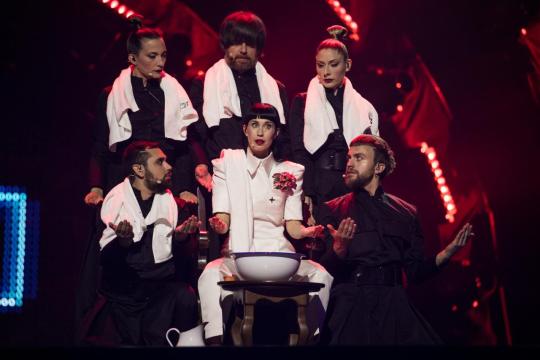
ZVANIČNO SAOPŠTENA IMENA UČESNIKA “PESME ZA EVROVIZIJU”: Sa lažnog spiska nema Kebe, Goce Lazarević, Maje Nikolić, Sofronijevića, Breskvice…
Pošto je poslednjeg dana decembra završen konkurs za izbor predstavnika Srbije za Pjesmu Evrovizije 2023. Radio televizija Srbije(RTS) je 9.januara zvanično saopštila koji su izvođači i pesme prošli konkurs, odnosno ko će biti učesnici dve polufinalne večeri 1. i 2. marta. Ukupno je na konkurs pristiglo oko 800 pesama, a pobednik i predstavnik Srbije na ovogodišnjoj Evroviziji biće poznat posle finala “Pesme za Evroviziju” koje će se održati 4. marta. Nekoliko dana pre nego što je RTS objavila zvaničan spisak učesnika u javnosti se pojavio lažni spisak koji su mnogi mediji preneli “zdravo za gotovo”, ali se ispostavilo da je od 36 navodnih učesnika sa tog spiska pogođeno tek 12 od 32 učesnika koje je odabrala selekciona komisija. Iako se neki od tih prethodno pominjanih izvođača već viđeni i kao favoriti takmičenja sada je sasvim jasno da na “Pesmi za Evroviziju” neće učestvovati ni Dragan Kojić Keba, ni Gordana Goca Lazarević, takođe ni orkestar Aleksandra Sofronijevića…Među učesnicima nema ni mlade zvezde Breskvice, pa ni Tijane Bogićević, koja je već jedanput predstavljala Srbiju na Eurosongu, kao ni Maje Nikolić i Ivane Jordan. Svi oni su navođeni kao učesnici na pomenutom lažnom spisku.
Od onih koji su prošli konkurs i koji će se takmičiti da predstavljaju Srbiju u maju u Liverpulu, u manjini su poznata pevačka imena, kao što su Tijana Dapčević (sa pesmom “Mamim”), grupa “Frajle”(“Neka, neka”) i Filip Žmaher (“Čujemo se sutra”). A od novih i sve popularnijih izvođača među učesnicima su Angelina, Zejna i nova, mlada postava grupe “Hjurikejn”. No možda je, ipak, interesantnije da se i pesma “Viva la vida” poznatih autora iz sveta narodne muzike Nine Ademovića i Gorana Ratkovića Raleta dopala selekcionoj komisiji, a nju će na “Pesmi za Evroviziju” izvesti prošlogodišnji učesnici takmičenja "Zvezde Granda” Aleksandar Simić i Nenad Osmanović. Pominje se da iza ove pesme i dueta navodno stoji Saša Popović koji je ovu numeru 11 godina čuvao u svojoj fioci baš za jednu ovakvu priliku. Među favorite ovogodišnje “Pesme za Evroviziju” može se uvrstiti još jedan učesnik Zvezda Granda - Savo Perović kome je pesmu “Presidente” uradila Sajsi MC. Imena ostalih učesnika za sada retko da kome nešto znače, ali možda se baš među njima krije neko ko bi mogao da napravi iznenađenje kao što je to lane učinila Ana Đurić Konstrakta. Na spisku učesnika su, recimo, Stefan Zdravković, Ivona Pantelić, Boris Subotić, Matija Zanata, Nađa Terzić, Adem Mehmedović, Doris Milošević, pa još jedna Nađa (kojoj je pjesmu uradila Kristina Kovač), Jovana Tomašević, Filip Baloš, Stefan Maljoković, i drugi. Prva reagovanja na spisak učesnika ukazuju da je u pitanju “takmičenja anonimusa”, dok drugi odgovaraju da se takmiče pesme, pre svega, a to da li vam je neko poznat ili ne, nema veze (ili ne mora da ima veze) sa kvalitetom nastupa ili pesama. Neki su već, reagovali i na činjenicu da je predsednik Upravnog odbora RTS-a Branko Klanšček, zajedno sa Aleksandrom Filipovićem,,autor pesme “Kao grom iz vedra neba” koju će izvesti Jovana Tomašević. Producent Saša Mirković je u svom stilu i na osnovu svojih izvora već dao prognozu da će pobediti Boris Subotić! U svakom slučaju prošlogodišnji veliki uspeh Konstrakte pojačao je interesovanje za srpski izbor za Pesmu Evrovizije i ko zna kakve nas još iznenađenja i pikanterije očekuju do 4. marta, pa i do kasnih sati tog dana.
#eurovision#evrovizija#pesmaevrovizije#pesma za evroviziju#srbija#serbia#konstrakta#liverpul#esc serbia#ogae#ogaeserbia#eurosong#pesme#muzika#festival
0 notes
Photo
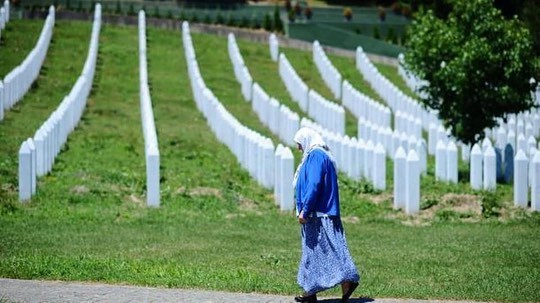
11 TEMMUZ 2019'A DOĞRU ... Bir Srebremica Annesi (ZEYNA SULYİÇ) daha öldürülmüş olan 6 Çocuğu ve 13 ile 11 yaşındaki 2 torununun, adalet önünde hesabını sormadan, adaletin sağlandığını görmeden Hak'kın rahmetine kavuştu. Allah Rahmet Eylesin. Preminula srebrenička majka Zejna Suljić – u genocidu joj ubili šest sinova, unučad od 13 i 11 godina #srebrenitsa #srebrenica #bosnia #bosniaandherzegovina #sarajevo #bosnahersek #boşnaklar https://www.instagram.com/brhn_hsgc/p/BuvZBiGA4hM/?utm_source=ig_tumblr_share&igshid=gx2vlawhmp84
0 notes

